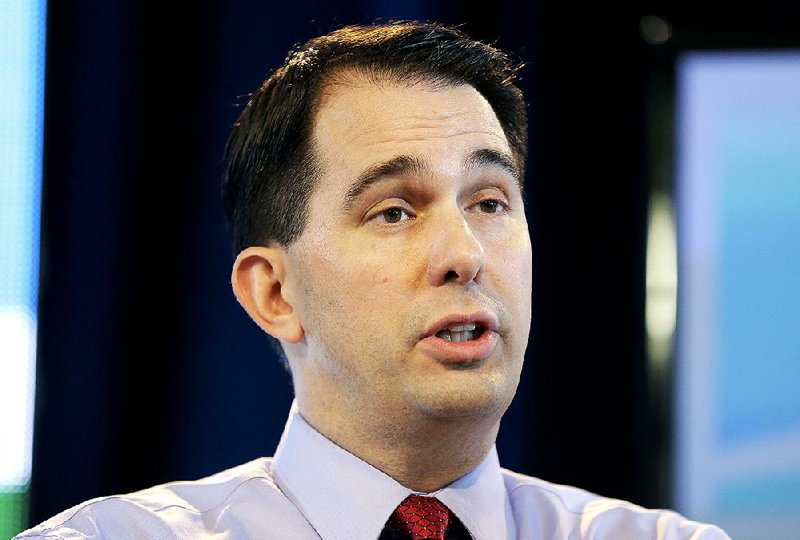DENVER -- Thanks to Wisconsin Gov. Scott Walker, it's becoming even clearer that immigration is the banana peel of 2016 Republican presidential politics.
Just ask Florida's Sen. Marco Rubio.
He stepped up as a Senate leader on immigration only to slip and fall in a Tea Party ruckus over the issue. Rubio remembered the months of trying to get back up as "a real trial for me."
Others, too, have shifted on the matter.
In 2013, Walker said it "makes sense" to offer a way to citizenship for illegal aliens. Early this month, however, he said he no longer supports "amnesty."
Complicating that switch, Walker recently discussed immigration with New Hampshire party leaders. One of them, state leader Jennifer Horn, said Walker favored legal status, a position many conservatives equate with amnesty.
Worse for Walker, The Wall Street Journal reported Thursday that he actually said he favored a path to citizenship, though Horn denies Walker said that.
Even former Florida Gov. Jeb Bush, who has a strong voice -- and a book -- on immigration, has wiggled.
Rubio and Walker are not alone in embracing an immigration overhaul at some point. But doing so raises the specter of amnesty in the minds of those who want people unlawfully in the country to be given no relief from the threat of deportation.
"All the candidates have mixed statements -- they have statements that seem to support amnesty, and they all have ones that seem to oppose it," said Roy Beck, executive director of Numbers USA, which seeks to reduce immigration. "They're torn between the big-money people who gain from high immigration and the voters who oppose it."
Luis Alvarado, a California-based GOP strategist, said most Republican officials privately acknowledge that the country has to legalize the status of people who are here unlawfully, while also bolstering border security. "They believe that no one in their conscious mind can deport 11 million people from this country," Alvarado said. "But, politically, they have to play word games to be elected in the primary."
Among the potential 2016 hopefuls:
• Bush has said he will not back away from his support for giving legal status to many who are in the country illegally. But his 2013 book outlining that stance marks a departure from an earlier position that envisaged eventual citizenship.
• Before he shied away from the issue, Rubio co-wrote a bill with a path to citizenship that passed the Senate and failed in the House. He now says the bill does not have the support to become law and the first focus should be on border security, a standard GOP position. Rubio ultimately wants to create a process that leads to legal status and then citizenship.
• Kentucky Sen. Rand Paul voted against Rubio's bill but says the millions of people in the country illegally cannot all be sent home.
• New Jersey Gov. Chris Christie once supported an overhaul; now he won't say where he stands. His state, though, is backing other Republican-led states in a suit against President Barack Obama's orders deferring deportation for some illegal aliens.
• Former Texas Gov. Rick Perry is talking tougher on immigration than when he called his 2012 campaign rivals heartless if they opposed a law letting some children of illegal aliens pay in-state tuition at public colleges. Even so, he says the U.S. will not deport all people here illegally.
Texas' Sen. Ted Cruz, the only declared candidate so far, has kept a fairly consistent tough line on the issue.
Matt Schlapp, chairman of the American Conservative Union, said "the ground has shifted" on the issue for two reasons. He cited the influx of Central American youths crossing the border illegally over the summer and overwhelming federal officials, and said Obama's unilateral acts to shield some people from deportation made it politically impossible for a Republican to embrace a pathway to citizenship.
But Frank Sharry of America's Voice, which supports an overhaul, said some of Bush's rivals are "going to be accused of flip-flopping, and that's going to become a character issue," playing into Bush's hands.
The wide-open nature of the GOP race also brings to light a tension between what some Republican fundraisers want -- an overhaul with a legal path -- and what conservative primary voters wish for.
Spencer Zwick, finance chairman for 2012 Republican nominee Mitt Romney, is one donor who has said he will only support candidates who favor such an overhaul. At this early stage, the competition for dollars has been more intense than the competition for votes.
"Once they get into the debates, this all changes," Beck of Numbers USA predicted, meaning he expects the candidates to rally behind a harder line.
A Section on 03/29/2015



